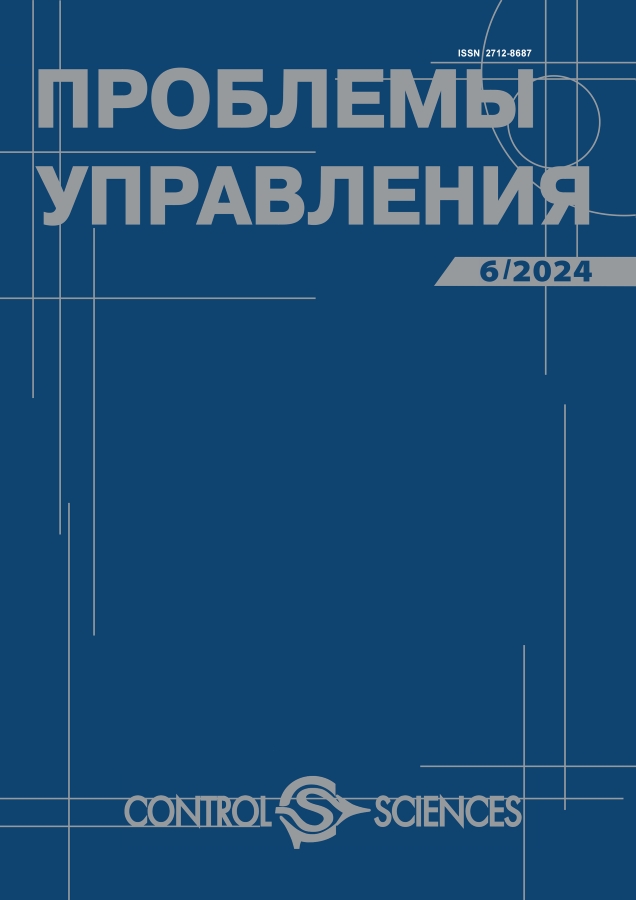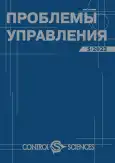No 5 (2023)
Surveys
Distributed Intelligence of Multi-Agent Systems. Part I: Basic Features and Simple Forms
Abstract
This multi-part survey is devoted to the empirical characteristics and manifestations of intelligence as the capability of an autonomous agent to perceive, process, and use information in order to achieve its goal. Part I of the survey briefly describes the most significant attributes of “proto-intelligent” and intelligent systems, together with the main features of distributed intelligence (DI), individual human intelligence (HI), and artificial intelligence (AI). An inseparable connection is emphasized between the DI of human organizational and social systems and individual human intelligence. The simplest forms of “swarm” intelligence are considered as examples, and the key factors determining the effectiveness of DI in such multi-agent systems are presented, including the structure of interactions between agents, their collective goal-setting, external information recording, convolution, and processing, and the standard “images” of external influences. Their combination pushes the performance of a multi-agent system far beyond the capabilities of its individual agents. In part II of the survey, different forms of collective intelligence in human social systems will be analyzed and all known types of intelligence will be generally classified.
Control Sciences. 2023;(5):3-22
 3-22
3-22


Cournot Oligopoly: Strategy Choice under Uncertainty and Other Problems
Abstract
Firms operating in a market economy naturally strive to increase revenues. When large firms affect prices by their actions, this task involves nontrivial mathematics, i.e., game-theoretic oligopoly models. The survey is more concerned with Cournot competition than with Bertrand competition. The existence, uniqueness, and stability of Cournot equilibrium are discussed. The other issues under consideration are as follows: the entry of new firms into the market; the barriers that can be imposed for this; and the impact of such an entry on society’s welfare as well as on total surplus and consumer surplus. The problems of collusion between firms are touched upon. Publications comparing the prices of goods, the profits of firms, and society’s welfare under Cournot and Bertrand competition are overviewed. Much attention is paid to the problems faced by firms due to the ignorance of some current or future market conditions and the existing uncertainty. The issues of information sharing among firms are considered. One approach to reducing marginal cost is the purchase of licenses; licensing in a Cournot duopoly is also described. Computational methods for Cournot equilibria in the case of multi-product firms are presented. Finally, publications with particular applications of Cournot equilibria are considered.
Control Sciences. 2023;(5):23-39
 23-39
23-39


Analysis and Design of Control Systems
Control System Design for Moving Objects with Channel Switching
Abstract
This paper considers the problem of designing control systems for moving objects with control channel switching. A generalized characteristic is proposed to eliminate jumps and impulses that may occur at switching instants. This characteristic describes the entire ensemble of system trajectories under control channel switching at an arbitrary random instant. A numerical inversion method is developed for the Laplace transform based on expanding the delta function into a series of exponential polynomials. With this method, the generalized characteristic of the system can be approximated by a given time domain. The exponential series description of the generalized system characteristic allows reducing the original design problem to a system of algebraic inequalities. A particular example of designing an automatic pitch control system for an aircraft with a normal overload limit is presented; as is shown, the entire ensemble of trajectories obtained for different channel switching instants belongs to a given time domain.
Control Sciences. 2023;(5):40-49
 40-49
40-49


Control in Social and Economic Systems
Strategic Capabilities as a Driver of Competitiveness: A Comparison of Russian and Global Companies
Abstract
Competitiveness is a key measure of success for countries, industries, and companies. This study is devoted to the strategic capabilities underlying the competitiveness of companies in the Russian market. The theoretical foundations of strategic capabilities are conceptualized, and their role in the development of competitiveness through strengthening the competitive advantages of companies is emphasized. The research methodology of strategic capabilities is based on the leading publications of foreign and domestic scholars over the last 30 years. The empirical part of this study considers both the general and specific strategic capabilities of 30 Russian and multinational companies operating in the Russian market. According to the empirical results, Russian domestic companies focus on the development of one particular strategic capability only; Russian exporters have a more differentiated approach, developing a significant number of strategic capabilities simultaneously; finally, multinational companies endeavor to develop a balanced set of strategic capabilities. The most important strategic capabilities of companies in the Russian market are identified as follows: employee professionalism, quality control, innovations and unique technologies, corporate brand and reputation, market and trend understanding, customer orientation, and flexibility. The research results have practical value and can be used by Russian companies as key factors for increasing their competitiveness in the Russian market as well as in new foreign markets.
Control Sciences. 2023;(5):50-67
 50-67
50-67


Modeling Social Attitude to Introducing Epidemic Safety Measures in a Pandemic
Abstract
The COVID-19 pandemic is a global human-scale emergency that has caused many negative effects. To mitigate them, it is necessary to take competent and well-founded organizational measures. Considering infectious diseases from a mathematical point of view allows solving problems in various spheres of society, studying possible scenarios, identifying epidemiological evolution patterns, and proposing intervention strategies and epidemic control options. This paper presents a mathematical model for forecasting opinion dynamics on various socially significant issues, in particular, on the introduction of epidemic safety measures in a pandemic. The model reflects the process of information exchange considering the content of disseminated information and the communicative properties of the social system and its elements (connectivity, susceptibility, and sociability).
Control Sciences. 2023;(5):68-77
 68-77
68-77


Information Technology in Control
Expanding the Functionality of an Applied Geographic Information System for Modeling Search Correlation-Extreme Navigation Systems
Abstract
This paper further develops the concept of an applied geographic information system (AGIS) for modeling search correlation-extreme navigation systems (CENSs) intended to control moving objects. The possibility of using parallel, distributed, and cloud computing for modeling CENSs is investigated. In modern conditions, it is necessary to diagnose the operation of CENSs under stress exposure on their shooting systems. The stress exposure parameters are modeled by accessing specialized databases containing the characteristics of terrain objects in different electromagnetic radiation wavelength ranges. As a rule, such characteristics are unavailable in geographic information systems (GISs) and cloud environments. It is demonstrated that CENSs should be diagnosed by modeling the shooting system using cloud GISs. The issues of parallel computing for pattern recognition tasks are considered. The peculiarities of the parallel structure of CENS search algorithms are revealed. When implementing these algorithms in parallel computing systems, proper consideration of the peculiarities allows utilizing their advantages to the highest degree.
Control Sciences. 2023;(5):78-90
 78-90
78-90


Control of Technical Systems and Industrial Processes
Component Monitoring to Manage the Redundancy of an Onboard Equipment Complex
Abstract
This paper considers the technical condition monitoring problem for the components of an onboard equipment complex to perform its real-time reconfiguration. The idea is to use at least three levels of monitoring systems: the nearest perspective, only traditional built-in control (BiC) means to detect faults; the next level, BiC means together with auxiliary means to increase the reliability of technical diagnosis, including mutual cross-pair monitoring; the distant perspective, logical processing algorithms for system observations as a whole based on the normalized rules of functional hazard assessment (FHA) of aviation equipment. Mathematically, the pair monitoring of component conditions consists in forming the so-called preference matrices; their values and special tables are used to determine the condition of diagnosed objects with high reliability and, moreover, to evaluate possible errors of diagnostic tools. For third-level methods, an action sequence is proposed as follows: the reverse and direct logical models reproducing the dependencies of failure states based on FHA results are alternatively initiated. An updated methodology for handling triplex logical models is proposed. The main advantages of logical models––significant simplicity and universality––ensure their effectiveness in a wide range of dynamic systems of varying complexity. A methodological example illustrates the application of logical triplex models.
Control Sciences. 2023;(5):91-109
 91-109
91-109












